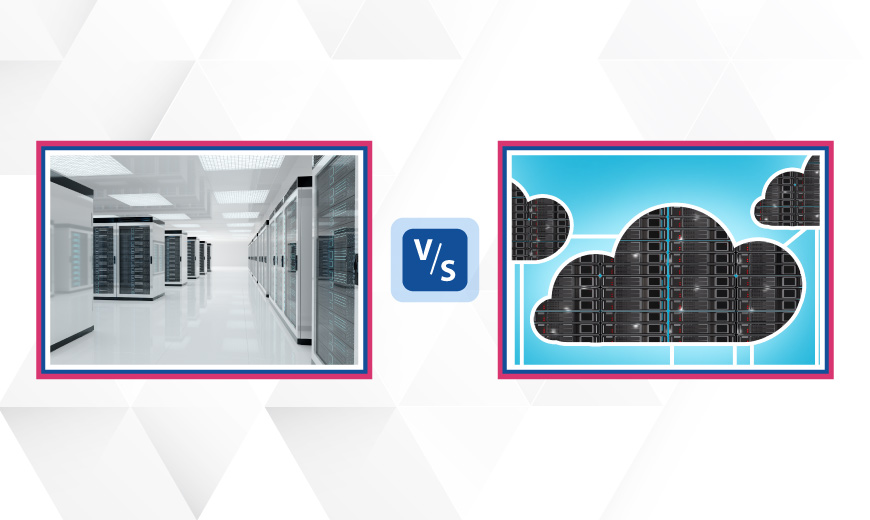Various servers are available to make computing more accessible and swift. Physical and virtual servers are two of those servers that provide swift and secure computing resources to their users. However, both are hosted on different infrastructures and serve distinct purposes.
In this comprehensive blog post on physical vs. virtual servers, we will explain the differences between these two types of servers. Stay tuned!
Physical vs. Virtual Servers: Get Expert Advice Now!
A] What Is a Physical Server And Virtual Server?
A physical server is a tangible computing resource that runs computing tasks by utilising physical versions of computing resources such as CPU, RAM, memory, and storage. It is a traditional way of abstracting computing resources without creating a gap between physical resources and operating systems. Physical servers are known as ‘bare metal servers’ or ‘physical dedicated servers’.
Virtual Servers are virtually-enabled servers that utilise physical computing resources, such as CPU, RAM, memory, and storage to create multiple virtual instances. Within a single physical server, each virtual server is allotted separate computing resources. It utilises a specialised software, called hypervisor, to create partitions into physical instances and allocate each virtual machine (VM) a separate computing resource. At its base, all cloud deployment models are virtual servers, utilising its physical instances to offer cloud computing services to its users.
B] Exploring The Difference Between Physical Server And Virtual Server
1. Performance
Due to the utilisation of standalone physical instances, physical servers are known to be performance-beast servers. It dedicates all the computing resources to a single user, making it suitable for businesses that use resource-intensive in-house applications. However, physical servers demand expensive tangible computing hardware installation to offer the best performance.
Besides the dedicated cloud server, physical servers may beat virtual servers in terms of performance. The dedicated cloud computing model is the only cloud deployment model that offers an above-the-same level of performance due to its isolated nature. Businesses with resource-intensive in-house applications can leverage the physical server’s performance without installing expensive physical computing hardware within their premises.
2. Space Requirement
Physical servers are provisioned over multiple physical computing hardware, such as CPU, RAM, memory, and storage. Based on the requirement of your computing resources, installing these physical computing resources takes up space and extensive investments. With a physical server, businesses need to create a separate server room to install the physical server’s hardware.
Virtual servers are replicas of physical servers which also require space but businesses can opt for IT cloud consulting services; It eliminates the headache of acquiring space and investing in expensive physical computing hardware.
3. Security
As physical servers are not shared with other users, it excels in offering secure ground for hosting critical data on local systems or servers. The isolated nature and dedication to a single user eliminates changes of cross-server breaches and safeguard the data from cyber-threads.
Except for dedicated cloud servers, virtual servers are more prone to provide ground for cross-server breaches or cyber-attacks. Dedicated cloud servers are exact replicas of physical servers; they offer more than a secure environment for hosting critical data on the cloud. Due to the implementation of other robust security measures, such as firewalls, data encryption, data backups on separate servers, access control and DDoS protection, dedicated cloud servers provide top-notch security which may not be possible with physical servers.
4. Scalability
When comparing the difference between physical machines and virtual machines, physical servers may pose a limitation on businesses in terms of scalability. To scale the computing resources of physical servers, businesses have to invest heavily in physical computing hardware.
On the other hand, virtual servers are known for offering intuitive scaling options without investing in physical computing hardware. With virtual servers, businesses can seamlessly extend their cloud computing resources without needing to go on heavy investment.
5. Maintenance
The user of the physical server is solely responsible for handling, updating and maintaining its server. It requires frequent attention as well as investment to keep the server performance at optimum. For larger business infrastructures, physical servers demand separate IT staffing to manage their physical instances, thus increasing investment.
Virtual servers, on the other hand, are managed by the providers. The updates, routine server assessment, and physical hardware maintenance are all handled by the cloud computing service provider. It eliminates the maintenance headache of the user and allows them to focus on their core competencies. Luckily, Absolute Cloud offers 24/7 support via a dedicated relationship manager and a response time of less than 5 minutes.
6. Cost
Since physical servers require an extensive amount of investment to acquire and install physical computing hardware, it is known to be one of the costlier server setups. Businesses have to purchase every piece of hardware and either install it on their own or hire IT staff which further increases their investments.
Due to the elimination of physical hardware investment, virtual servers are comparatively cost less than physical servers. All the physical computing resources and other associated hardware are provided by the providers, making it one of the cost-effective ways of leveraging excellent computing capabilities.
C] Virtual Servers Vs Physical Servers: Which One To Choose
Before choosing the best server, it is essential to assess your requirements. The cost, performance, security, scalability, and maintenance are the prominent points that need to be assessed carefully to choose the best-fit server for your business.
If you run a business that has a significantly low customer base or a 0 to 10 employee base, installing a physical server would be the best fit for you. On the other hand, if you deal with a larger set of customers and employee bases, choosing a virtual server would be a wise choice. In addition, you can virtualise every single physical instance by choosing different types of virtualization in cloud computing to cater to your specific virtualisation needs.
Physical vs. Virtual Servers: Get Expert Advice Now!
Conclusion
So, here we are. We have covered all the physical server and virtual server differences and learned how to choose the best one. But, if you want to experience the advantages of physical servers without investing too much amount for acquiring and installing physical computing hardware, a dedicated cloud server is for you. It offers the same benefits as a physical server does. It offers unlimited scalability options, eliminates the headache of maintenance, and costs a lot less than a physical server.
If you are ready to get a dedicated server for your business, contact Absolute Cloud. Absolute Cloud is a leading and renowned provider of dedicated servers in India, known for offering cost-effective and highly efficient dedicated cloud servers to businesses and individuals. Contact us today and host your data on the cloud.
Other than that, we also provide Linux dedicated servers and Windows dedicated servers for those who love to work on selective operating systems while leveraging the benefits of physical servers.

Mr. Sachit Saraf
Director of Absolute Cloud and a second-generation leader in cloud computing, Sachit excels at merging technology with business acumen. With expertise in data analytics, business intelligence, and cloud solutions, he is committed to providing secure, 24/7 online access to critical software. Sachit’s passion lies in leveraging analytics for data-driven decisions, optimising processes, and driving transformative growth in the tech industry.


